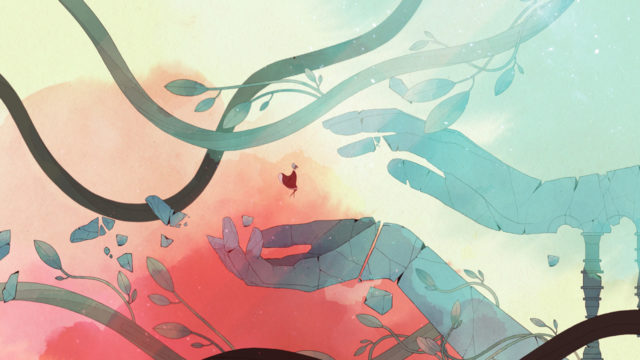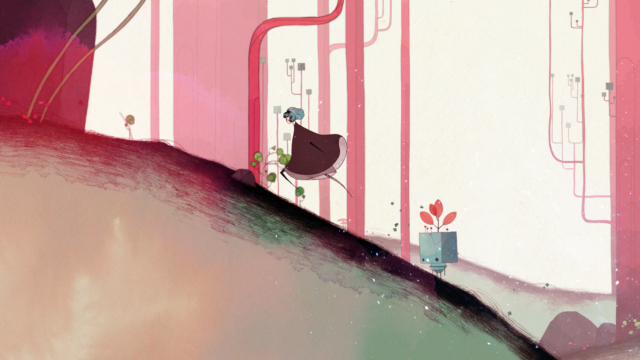Fantastic art direction; gorgeous soundtrack; ambiguous, yet emotional, narrative; artful throughout
Rather short; very little challenge; not everybody likes ambiguity in their storytelling
While the debate might pop up from time to time nowadays, I think that the argument over whether or not video games are art has pretty much been settled. Artistic intent has always been an aspect of the form, but the last ten or so years of growth among independent developers has opened the door for more purely focused works of art. At this point, arguing against the artistic merit of video games is a fool’s errand. However, this doesn’t necessarily mean that succeeding as a piece of art automatically guarantees success as a great, must-play game. While it is far from bad, and in fact rises well above mediocrity, GRIS is a relatively good example of this idea.
In terms of genre, GRIS is a side-scrolling platformer with light puzzle elements, but the gameplay is less of a main draw as it is a framework for the aesthetic and thematic focus of the game. Regardless, the actual mechanics are actually pretty good, if not somewhat limited. Like many of its genre kin, GRIS has players running and jumping through the game world, occasionally stopping to interact with it in the form of simple puzzles. There is a decent sense of growing complexity throughout the game as new abilities are occasionally unlocked, but the game never really pushes into the realm of actually being challenging. The developers obviously want gamers to experience the entirety of their game without too much of a fuss, thus the number of new mechanics is kept relatively low and their uses very well defined, an idea that might frustrate those looking for a challenge. There are extra, optional collectibles that do require a bit more effort to collect, but the toughest part is really locating them, and not so much overcoming the obstacles surrounding them.
One very smart idea that I feel benefits both the artistic and mechanical intent of the game is the fact that it is pretty much completely wordless. GRIS never stops to tell you what is happening or how any of its controls or powers work, but it successfully communicates everything you need to know through smart visual design. It certainly helps that they keep the mechanics and level of challenge relatively simple, but the fact that the game gracefully uses the visual design to drive both the narrative as well as the more practical elements of game design is worthy of merit.

And when it comes to that story, well, I’m not sure I can tell what exactly it is. GRIS comes across as intentionally vague and open to interpretation in a very good way. You start as the titular character, a young woman who very soon finds her world literally crumbling beneath her and plunges to a land devoid of life and color. Much of the game has a somewhat post-apocalyptic vibe; a world in which human society has vanished, leaving behind edifices to be reclaimed by nature. Throughout her journey, Gris acquires new powers as she restores color to the world and discovers that while humanity might be gone, there are still smaller signs of life in a world that is frequently reactive to her presence, but not really hostile. As I said earlier, no words are ever uttered, but there is still a sense of mood and purpose as you feel Gris is piecing this world back together so she can once again ascend to the higher place from which she started.
This general lack of danger could prove to be the most contentious factor among gamers considering whether or not to play the game. In GRIS, your character’s life is never at risk and the only progress you might lose is just a few mere moments. There is an antagonist within the game, a shadowy malevolent force that shows up a few times throughout the adventure, and while it is an obstacle that requires a little thought to overcome, it cannot kill you or seriously set you back. Those looking for a serious challenge will likely be annoyed or disappointed, while those who just want to see the game through to its conclusion might be appreciative.
However, the thing that might irk some players most is the length. Like many similar games, GRIS is rather short, likely taking no more than three hours for most gamers to get through with some probably reaching the credits even sooner. And even with that being said, there are times where I feel like the game could be sped up a little bit as you do occasionally find yourself trekking across larger areas that will make you wish Gris ran a little faster. There are the extra collectibles to collect which could add some time to the game, but it won’t be substantial. Regardless, I personally found the length quite satisfactory considering the game’s purpose.
One reason I was fine with GRIS as is, is because it is a phenomenally gorgeous game. Plenty of games out there have succeeded in part due to great visual design, but GRIS is among the most beautiful platformers ever made. At the beginning, the game has a minimalist look, but over time, as you restore color to the world and explore more detailed areas, everything comes to life with a look that is simultaneously unique and classic. A lot of the game’s visual design is reminiscent of water color, but the look of the world and characters, alongside their animations, is quite original. The evolution of the design in terms of color and complexity helps further the wordless, ambiguous narrative running throughout.
The music also helps reinforce the visual design and once again backs up the story’s apparent themes. Throughout much of the game, the soundtrack is very simple, often settling into a pleasant and appropriate background ambiance, but the way in which it changes in reaction to even relatively small actions performed by the player is truly impressive. Interacting with some objects and even walking on certain surfaces creates audio feedback that weaves into the music seamlessly. Of course, the songs also rise and fall with the action, and it does this to great effect. The encounters with the aforementioned malevolent forces present no actual gameplay threat, however the music helps sell a sense of danger that still makes the encounters surprisingly tense. Furthermore, I appreciate how in an age where more and more games (and pretty much everything) tend to be reaching back to the eighties for their nostalgic inspiration, GRIS incorporates very classic instrumentation alongside some great vocal melodies that ultimately hold greater relevance throughout the story. Ultimately, I think the best way I can express my feelings about the music is that within minutes of booting up the game, I checked to see if and when I would be able to buy the soundtrack.

Switch has proven very attractive to, and profitable for, independent developers, so it has played host to a number of games I would describe as narrative platformers: games that use basic platforming and puzzle solving concepts alongside a more story or mood driven focus. While these games might not be the most appealing for gamers desperate for a serious challenge, they do represent an interesting, more artistic approach to a genre that has long been better known for its gameplay than its plots. Among these sorts of games (see Pinstripe and Forgotten Anne), GRIS is perhaps the least developed in terms of gameplay and its more ambiguous approach to storytelling might turn off those of you who prefer a more concrete story. However, it also happens to be incredibly gorgeous and features a fantastic soundtrack that helps sell the emotional weight of its wordless narrative. So, personally, I found GRIS to be a worthwhile experience but I can also fully understand those who won’t see the appeal.
Nintendojo was provided a copy of this game for review by a third party, though that does not affect our recommendation. For every review, Nintendojo uses a standard criteria.




 ShareThis
ShareThis





